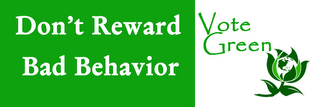This weekend I was waiting on my fiancee in a mall in Portland and I started to think about voting. I used to be very gung-ho about voting. This isn't really much of a surprise since I was also a Fox News watching, Bush voting, hard-core, jingoistic patriot. However, since my political deconversion (which I view as being, at least in practical matters, more important than my religious deconversion) I now look at voting much differently.
As I've mentioned in a previous
post, I think the two-party system is absolutely horrible, a complete joke of a democratic system. As Hellen Keller once said
Our democracy is but a name. We vote. What does that mean? It means that we choose between two bodies of real -- though not avowed -- autocrats. We choose between 'Tweedledum' and 'Tweedledee'
showing that even being blind and deaf is not an excuse for believing in the 2P system.
But anyway, it's what we've got, and until we can change it, how should we act within it? One suggestion is that we vote Democrat. Why would I want to do such a thing? The Democrats don't even have the moral clarity to be able to denounce the Republicans strongly for what they're doing. Senator Biden quickly retreats from any suggestion that Bush should be impeached, and simply stops at censure. And I choose Biden because he seems to be one of the better Democrats. Most Democrats wouldn't even speak favorably of Biden's censure resolution. I'm sorry, but if you can't even say with confidence that Bush should be
censured, then there is no way in hell that you deserve my vote. And in many respects, Democrats are very much like Republicans. Most Democrats are also just as much in the hands of big business as the Republicans are. Democrats have started wars of aggression against innocent people in the past also; Iraq wasn't an Republican invention (which is another thing that Democrats won't denounce strongly enough to make an impression on the American people). The Democrats do differ from the Republicans in their rhetoric however, but less so recently, and with the Democrats looking at stealing some of the evangelical vote in the upcoming elections you'll probably see more references to God in their speeches as well.
Some suggest that voting is completely worthless and even harmful. They say it gives legitimacy to a corrupt system, which I think is hard to refute. It's the worthless attribute that I'm skeptical of, and I'll address that next. From those who want a completely different system, whether it being a different economic or political system, the claim is that this can't occur by participating in the current system, but that one must overthrow the current system by other means. I think that they are generally correct in this view, but I don't think that the solution is to not participate. Look around. Revolution is
not around the corner. Republicans are getting elected. I don't want to be in a revolution of people who vote Republican and defend torture on primetime TV. I think it makes sense to try to shift the political debate to the left first, and then, perhaps when people are more sympathetic to concerns relating economic fairness, sustainability, democracy, freedom, and peace, well then perhaps then we'll have a revolution and overthrow the corrupt systems that control our lives and endanger humanity.
I think the best thing that we can do is vote third party, such as the Greens. For one the Green positions are often close to my own and so it's nice to actually be able to vote for a candidate that represents my views in at least a rough sense. Voting Green shifts the political debate to the left, because it forces the Democrats to look to the left for votes. Without this incentive, the Democrats will simply go over to the right, which is where all the money and all the unquestioning voters are (thanks Jesus). And perhaps if enough people vote third party, we'll be able to start a movement toward a proportional representation (PR) system.
With this reasoning I've decided to become more active with the Green party. Will much good come out of it? I'm doubtful, but I'm not ready to completely give up on voting yet. During my wait at the mall I decided to create a bumper sticker for my car, as seen below.

If anyone is interested in purchasing one, you can buy them
here. And if you haven't checked out Cafepress before, you should. They have a lot of really nice designs, for t-shirts, bumper stickers, coffee mugs, etc.





